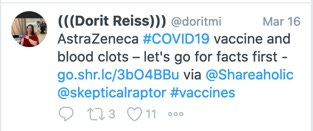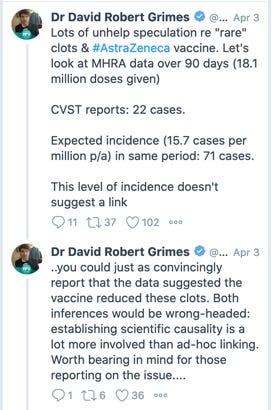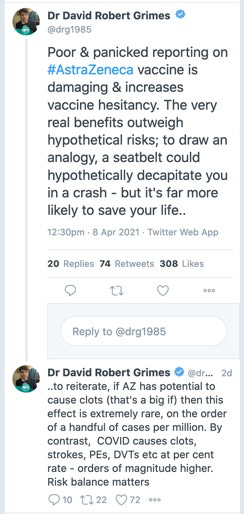Rare AstraZeneca Side Effect Exposes Vaccine Cheerleaders
As scientific evidence accumulated about possible vaccine dangers, the usual suspects screamed "SCIENCE!" and rushed to protect AstraZeneca: David Gorski, Steve Novella, Dorit Reiss, and David Grimes.
It didn’t take long after European regulators began questioning the safety of the AstraZeneca Covid-19 jab for vaccine cheerleaders to dash to AstraZeneca’s defense. But on Friday, medical experts published a study in the NEJM that sought to give the novel condition a new name: “vaccine-induced immune thrombotic thrombocytopenia (VITT).”
Quite a mouthful.
Cases of clotting and some deaths in people who’d received the AstraZeneca jab were reported last month, and the European Medicines Agency concluded last week that unusual blood clots should be listed as a very rare side effect—though regulators added that the vaccine’s benefits still outweigh its risks. A day later, the UK’s Joint Committee on Vaccination and Immunisation (JCVI) warned that it was “preferable for adults aged under 30 with no underlying conditions to be offered an alternative” to the AstraZeneca jab.
Many European countries, such as Germany and the Netherlands, had already restricted the AstraZeneca vaccine in younger people. And now Spain, Belgium and Italy have all moved to limit the vaccine to older patients.
This latest flurry followed a month-long drumbeat of concern after Denmark, Norway and Iceland temporarily suspended the vaccine and the European Medicines Agency (EMA) promised to look into blood clot reports. But as soon as the EMA began investigating, vaccine cheerleaders hastened to protect AstraZeneca, downplaying safety reports and charging critics with antiscience.
It was all rather predictable from this odd, cult-like collective who Scientific American’s John Horgan dismissed some years back for navel-gazing tribalism and a need to regularly pat themselves on the back as smarter than everyone else:
I’m a science journalist. I don’t celebrate science, I criticize it, because science needs critics more than cheerleaders. I point out gaps between scientific hype and reality. That keeps me busy, because, as you know, most peer-reviewed scientific claims are wrong.
First to the AstraZeneca defense on March 15 was Skeptical Raptor, a pseudonymous American blogger worshipped in “skeptic” circles.
Skeptical Raptor lived up to Horgan’s critique for unflinching science absolutism by alleging that AstraZeneca’s vaccine was on a “hit list.” (Who created this scary “hit list” is unknown.) According to the blogger, Nordic country medical experts’ alarming reports of blood clots were just “post hoc ergo propter hoc fallacy, which states that because one event precedes another event, they must be linked.”
After questioning whether blood clots were linked to the vaccine, Skeptical Raptor then provided the answer in skeptic catechism: “Spoiler alert – the answer is no.” This post generated 3.6 thousand Facebook shares among the faithful, and was promoted by Dorit Reiss on Twitter.
A law professor at UC Hastings, Dorit Reiss is a sometime blogger at Skeptical Raptor, and ardent vaccine absolutist, who sometimes gets her safety facts wrong. Last February Reiss tweeted that no vaccine has had latent side effects, meaning that problems appeared months or years after vaccination.
For a law professor who fancies herself a medical expert, Reiss has a rather unscientific view of vaccine science. While the vast majority of side effects are minor and happen soon after vaccination, researchers and science agencies have documented a few examples where side effects happened months or years after.
In 2011, the Institute of Medicine (IOM) released a report (Adverse Effects of Vaccines Evidence and Causality) that found the measles vaccine was a contributing cause of measles inclusion body encephalitis, which appeared four to nine months after vaccination. In an accompanying brief, the IOM concluded that the varicella vaccine for chickenpox can lead to chickenpox rash months to years after vaccination.
And a couple of years after the approval of the Pandemirix vaccine for the 2009 swine flu, researchers published a study in PLOS ONE linking the vaccine to narcolepsy, a chronic sleep disorder that did not affect vaccinated children until around 42 days later—in one case 242 days after. In fact, GlaxoSmithKline (GSK) and the Irish state settled a legal claim in 2019 brought by a student who developed severe narcolepsy after receiving the Pandemirix vaccine. The claim was settled for an undisclosed sum without admission of liability by either the state or GSK. (Note to reader: this vaccine is no longer used.)
Skeptical Raptor doubled down on the March 17 claims, with another post 11 days later arguing that AstraZeneca’s vaccine is probably not linked to blood clots, terminating any need for further investigation.
Another favored venue for skeptics is the ironically named Science Based Medicine, a group blog and Skeptic Bible
run by David Gorski and Steve Novella, professors of medicine at Wayne State and Yale university, respectively. Neither Gorski nor Novella publish much of anything on vaccines in peer-reviewed academic journals, choosing instead to harangue actual experts from the safety of their skeptic website. Novella’s piece on AstraZeneca made this point rather clear.
“The countries who have suspended use of the vaccine have been highly criticized for their decision, given that it is not supported by the science,” wrote Novella, on March 17, only a few short days after the EMA began investigating. “This is the background noise that experts monitoring the safety of the vaccines, or any medical intervention, have to deal with.”
Gorski then promoted Novella’s piece to his adoring Twitter congregation.
Not content with merely dismissing safety concerns, another skeptic, physicist David Grimes wrote for the Irish Times that reports of blood clots were—get this—a public health danger because “anti-vaccine activists will weaponize AstraZeneca’s suspension.” Much like Gorski and Novella, Grimes eschews peer reviewed medical journals when making his vaccine arguments, writing for the newspaper that safety precautions are “no substitute for evidence-based decision-making.” (Note to Grimes: op-eds don’t substitute for peer-reviewed research.)
As he often does, Grimes turned up the tenor on social media, tweeting the next day that suspensions by national health agencies were “ridiculous.”
Grimes continued batting away medical reports of blood clots, later tweeting that the evidence might even show that the vaccine “reduced these clots.” Seriously, Grimes tweeted this, see below.
Even after the EMA concluded that blood clots should be listed as very rare side effects of AstraZeneca’s vaccine, Grimes rejected the new evidence. That next day, he tweeted that the media reacted to the EMA’s decision with “poor and panicked reporting” and that the vaccine’s link to blood clots was still “a big if.”
Commenting on which stocks to trust, Warren Buffet once warned investors “Only when the tide goes out do you discover who's been swimming naked.” Well, the tide of evidence has gone out on vaccine cheerleading, and the skeptics have been caught dog paddling bare-assed.
“[A]ll individuals offered a COVID-19 vaccine should be fully informed about the benefits and risks of vaccination,” stated the UK government in response to the new findings.
Meanwhile, in the U.S., the AstraZeneca vaccine might not even get into people’s arms. AstraZeneca has not applied to the United States for emergency use, but experts advising the government told CNN that they wouldn’t take it, given other vaccine options. "All of them keep you out of the hospital and keep you from dying, but those three have a better safety profile," one adviser told CNN, referring to the jabs from Pfizer-BioNtech, Moderna, and J&J.
Those looking to the science skeptics to be fully informed should consider investing their trust elsewhere.











Marcus, I've had to delete your comment linking back to Steve Novella because that piece has factual inaccuracies and multiple bits of nonsense, like linking to the American Council on Science and Health. I don't mind the meandering and Novella's inability to address a critique, but we're not allowing anonymous accounts to link back to disinformation. Please do better in the future. Thanks.
That tweet from Reiss makes me fume. Typically for these kinds of people, she actually has no idea how the damn thing works. Once the mRNA has prompted the cell to start producing spike protein we have no idea how long that process will continue. The mRNA is encapsulated to prevent it from expiring rapidly. We actually have no idea how long that will persist. The downstream effects of these things are completely unknown and comparisons with other vaccines are comparing apples to Volkswagens. Utterly brainless. Apologies for the rant, but these people apparently just don't give a damn who they harm.